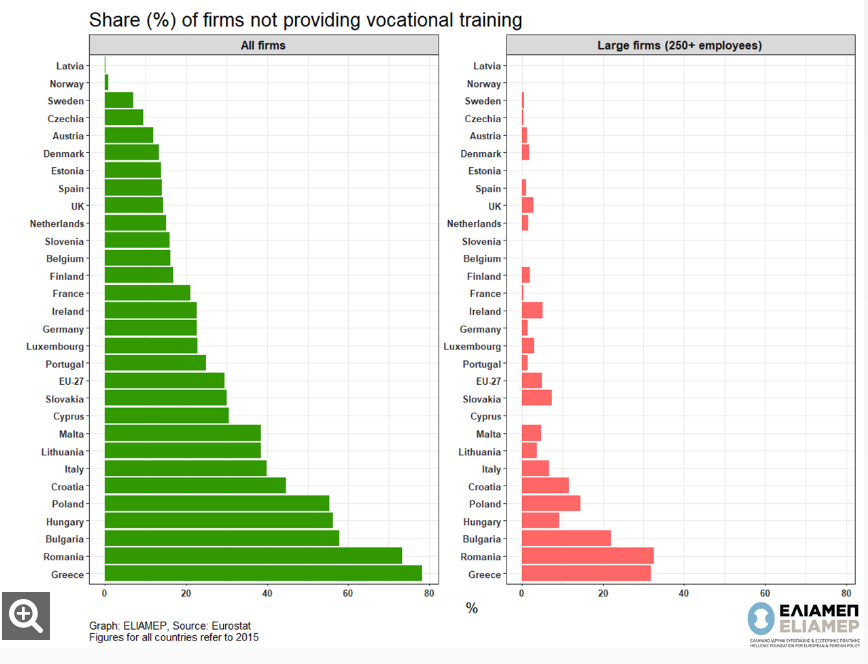

According to Eurostat, 78.3% of Greek firms offer their employees no training. Specifically, they do not provide any form of vocational training, either in-house or through external providers. This figure is the highest across the European Union, whose average is 29.5%. This clearly shows that the problem of Greece's low skills is not limited to the supply side (i.e. failures of education and training systems), covered in our previous note. It is also due to failures on the demand side: Greek firms are unusually reluctant to invest in their employees' skills.
The counter argument is well known. Greek firms are vastly smaller in size than their counterparts elsewhere in Europe, and therefore lack the capacity to invest in training.
That Greek firms are on average smaller in size compared to those in other countries is undeniably true. According to the European Commission, large businesses (with more than 250 employees) employ 35% of the workforce, while in Greece the equivalent figure is no more than 17%. The size of Greek firms does indeed hamper the growth potential of the Greek economy. However, size does not fully explain why firms choose not to invest in their workers' skills. In the EU as many as 66.9% of small businesses (with 10-49 employees) do provide vocational training; in Greece, that share among firms of the same size is only 18.6%.
Underinvestment in workers' skills persists across the size distribution. The share of large firms that fail to provide vocational training in Greece is, at 31.8%, the second highest in the EU (after Romania), and six times larger than the EU average (5%). By comparison, in Portugal only 1.4% of large businesses fail to offer training programmes to their employees.
As we wrote last week, low skills impede economic recovery by entrapping the economy in a low path to growth and by preventing the upgrade of Greece's growth model. The inefficiencies of the country's education and training systems are only part of the problem. The reluctance of Greek firms to invest in their employees' skills is the other side of that coin.
There are no easy fixes to this problem. Public policy should shift from subsidising self-employment (e.g. via social insurance legislation) to offering tax other incentives to firms that provide vocational training. At the same time, publicly-provided vocational education should be upgraded, and privately-provided vocational training overhauled. The obsession with maximising the "absorption" of EU funds has led to waste and should be abandoned; it should be replaced by rigorous evaluation of the quality of the training programmes funded, and close monitoring of the skills and employment outcomes of the workers trained. Crucially, employer associations and business leaders should acknowledge the problem, accept their share of responsibility, and do their part in bridging Greece's skills gap.
今年1月,新冠疫情突然而至。为了防止疫情扩散,我国采取了史无前例的交通阻断及人流限制措施,这也为我国农业农村经济发展带来了巨大挑战。

The Xinhua Institute, a think tank affiliated with Xinhua News Agency, on Friday issued a report in Kuala Lumpur, capital of Malaysia, titled "RCEP and the Vision of the Maritime Silk Road: New Frontiers for China-ASEAN Cooperation."
2025-04-14